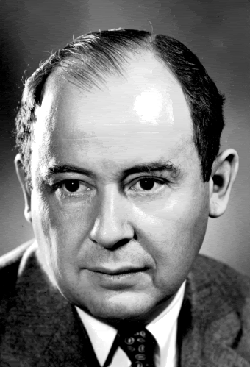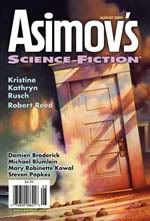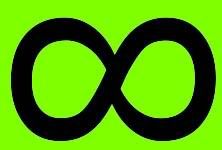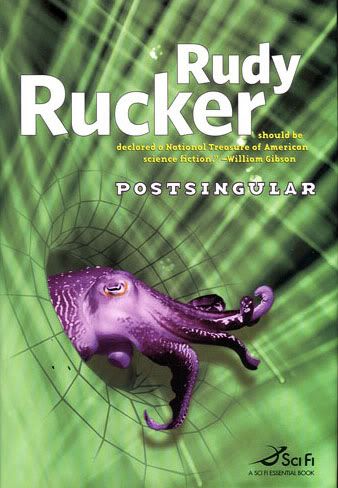Rudy Rucker
Tor
pp320
This quote comes from MikeWhat, then, is the Singularity? It’s a future period during which the pace of technological change will be so rapid, its impact so deep, that human life will be irreversibly transformed. Although neither utopian or dystopian, this epoch will transform the concepts that we rely on to give meaning to our lives, from our business models to the cycle of human life, including death itself. Understanding the Singularity will alter our perspective on the significance of our past and the ramifications for our future.
Treder, managing director of the Institute for Ethics and Emerging Technologies (IEET - which threw me off its forum before I'd written a single word on it), on the Singularity.
 The term "singularity" is a shortened from of the phrase "technological singularity" (updated to "computational singularity), and generally refers to a point at which computers will be so powerful that their intelligence will equal that of human cognitive powers before transcending them. US mathematics professor and science-fiction author Vernor Vinge, in a keynote paper, ascribes the first use of the word to Hungarian mathematician and Los Alamos scientist John von Neumann, who spoke in the 1950s of "approaching
The term "singularity" is a shortened from of the phrase "technological singularity" (updated to "computational singularity), and generally refers to a point at which computers will be so powerful that their intelligence will equal that of human cognitive powers before transcending them. US mathematics professor and science-fiction author Vernor Vinge, in a keynote paper, ascribes the first use of the word to Hungarian mathematician and Los Alamos scientist John von Neumann, who spoke in the 1950s of "approaching some essential singularity in the history of the race beyond which human affairs, as we know them, could not continue". Treder, on the other hand, perhaps takes the wind out of the concept's sails by informing us that it is "often derided as wish fulfillment for perpetually adolescent (and typically male) sci fi dreamers".
some essential singularity in the history of the race beyond which human affairs, as we know them, could not continue". Treder, on the other hand, perhaps takes the wind out of the concept's sails by informing us that it is "often derided as wish fulfillment for perpetually adolescent (and typically male) sci fi dreamers".Rudy Rucker's novel Postsingular, however, reveals a mind that, while bestowed (or burdened?) with a Y-chromosome, is mature and grounded. The novel's second chapter is adapted from a short story called
Chu and the Nants, which was published in Isaac Azimov's Science Fiction Magazine.
In both the short story and Postsingular, Chu is an autistic child who - like any child, I suppose - is both his mother's "joy, and her sorrow". Throughout the novel Rucker encompasses and transcends the two main genres of science fiction - "soft" (concerning sociological comment) and "hard" (concerning technological advance) - to show, for example, the joy of friendship, the pain caused by infidelity and the value of the real world, despite its sham, drudgery, and broken dreams, that m
 akes it worth fighting for.
akes it worth fighting for.The nants, arthropod nano-machines with power to devour reality and replicate it in virtual reality, are created by a scientist whose guilt drives him to create a world in which a childhood friend can live again. In other words, he sees no conflict between can and should. Chu's prodigious memory is an invaluable weapon in the battle against the creatures.
So we have the scene set for the second wave of nanomachines - orphids, lice-like creatures through whose actions, as Mike Treder says in the quote at the top of this post, human affairs are ireversibly transformed. For one thing, telepathy is possible and we see why Douglas Adams made this a punishment in The Restaurant at the end of the Universe: for the same reason that when Jesus said that "What you have whispered to someone behind closed doors will be shouted from the rooftops", it sounds rather ominous.
But do we have telepathy right now? No, but we have something close to it, in programmes like Big Brother, in which those who are interested can follow the minutiae of somebody's life who has consented to make their lives public property for their chance of winning a prize whose value starts at little more than zero and goes down from there.
In Postsingular, we have "dragonfly cameras" which make the activities of all visible to all who want to view them. More than this, we have scientists with wiki-patches in their brains - is this such a far step from Wikipedia, on which some scientists wish to publish
 their work pre-journal? More than this, we have a soap-opera called The Founders, in which said cameras follow those who were involved in the rolling-out of the lazy-eight dimension (geddit?) so that privacy is impossible.
their work pre-journal? More than this, we have a soap-opera called The Founders, in which said cameras follow those who were involved in the rolling-out of the lazy-eight dimension (geddit?) so that privacy is impossible.In positing a future society in which all is known, I believe that Rucker is inviting us to reflect upon our present situation, in which as much as we want known of others' affairs can be through, say, Google Earth: and he reminds us that the limit is within our control.
If Alan Turing, Steven Hawking and Spike Milligan formed a consortium to write science-fiction novels, they might come up with works that resembled the corpus of of Rudy Rucker. But the Swiftian whimsy, I believe, would elude them, like the lost chord animating the talking harp of legend whose rich seams Rucker mines.
In other words, Rucker is inviting us to imagine a world that isn't too different from our own, but which relies on what he calls transrealism:
By using fantastic devices it is actually possible to manipulate subtext. The familiar tools of SF — time travel, antigravity, alternate worlds, telepathy, etc. — are in fact symbolic of archetypal modes of perception. Time travel is memory, flight is enlightenment, alternate worlds symbolize the great variety of individual world-views, and telepathy stands for the ability to communicate fully. This is the “Trans” aspect. The “realism” aspect has to do with the fact that a valid work of art should deal with the world the way it actually is. Transrealism tries to treat not only immediate reality, but also the higher reality in which life is embedded.I had been worried that science-fiction was condemned to a death by whimper or by falling way behind technology in the real world, a theme recently explored by New Scientist. But as somebody who has gone on record with my cynicism about the quality of sci-fi writing after the mid-1970's, I have to say that Rudy Rucker has proved that my obituaries of the genre were premature. Reading the work, it's not important to know what Belousov-Zhabotinsky spirals are, merely to appreciate the misery of relapse into addiction; likewise, Calabi-Yau hypersurfaces pale in the light of love doing what it does best - not running smoothly. And I laughed when the space occupied by a syncretistic shopfront church called El Santo de Israel was occupied in the Hibrane (an alternative dimension) by a clothes shop where you can pick and choose.
Other than this, the most I can tell you about Postsingular without giving too much away is that if you think you've worked out the ending before the last page, you're wrong.

Related post: Master of Space and Time by Rudy Rucker












This item of golf clothes is lightweight and can therefore be easily
ReplyDeletestored in one of the many pockets found on the majority of today's golf bags. Those fault lines not only pointed at Nick, but they also pointed at various sets of parents, friends, neighbors. Best buys in shirting fabric are non-iron cottons or linens.
My site; jual blazer korea